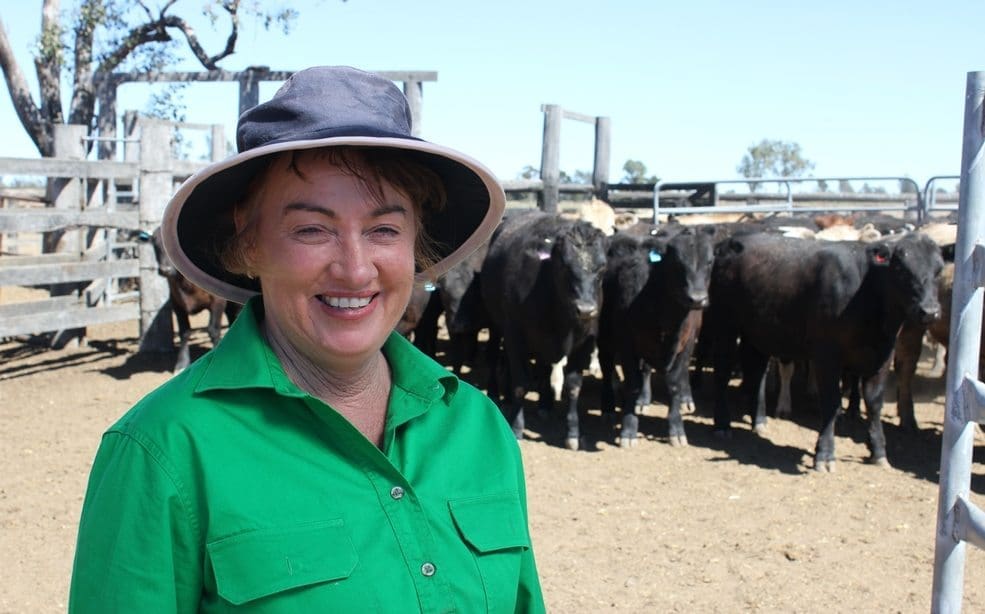
Kaylene Wonka, Blue Poles, Chinchilla, won the 2017 MSA Excellence in Eating Quality Most Outstanding Beef Producer award for Qld/NT on Friday night.
BEEF producers from Queensland’s western Darling Downs region have received the top awards at the 2017 Meat Standards Australia Excellence in Eating Quality Awards for Queensland and the Northern Territory, presented at Gympie on Friday night.
The awards recognise producers who have achieved outstanding compliance rates against MSA specifications, as well as high eating quality, as represented by MSA Index results for beef carcases graded during the 2015-16 and 2016-17 financial years.
In Friday night’s main results for the QLD/NT region:
- Chinchilla district beef producer Kaylene Wonka was judged the Most Outstanding Beef Producer
- Robert and Jenny Reardon, Reardon Operations Feedlot, Talwood, were judged Most Outstanding Grainfed Beef Producer, and
- John and Mary Atkins, Spion Kop, Taroom, won the inaugural Progress Award for achieving the greatest improvement in their MSA Index and compliance results since the 2014-15 financial year.
MSA program manager Sarah Strachan said the award recipients (details below) were to be congratulated for their work in producing some of Australia’s best beef.
“These producers have been outstanding in their commitment to produce beef that consistently achieves exceptional compliance rates to MSA’s strict specifications,” she said.
More than 14,000 producers throughout Australia consigned almost 5.9 million cattle to the MSA program throughout 2015-17.
To be eligible for the awards, a producer’s annual MSA-graded volume had to be equal to or above the average volume consigned for the State in which they were produced.
Each producer that met the eligibility criteria received a score out of 100 weighted on two factors – the compliance to MSA minimum requirements, and eating quality performance as determined by the MSA Index for cattle consigned to MSA in 2015-16 and 2016-17 financial years.
The MSA Awards aim to raise awareness of best management practice from producers who consistently deliver superior eating quality beef in their state ultimately for the benefit of consumers and for the profitability of the industry.
The Queensland region awards were the first of the MSA Excellence in Eating Quality Awards to be held throughout Australia and are being staged in conjunction with the ‘What Makes the Perfect MSA Index’ producer forums in each State. See upcoming awards and forum dates at bottom of this page.
Nutrition, genetics, temperament secrets to high MSA performance, says winner
Kaylene Wonka earned the 2017 Most Outstanding Beef Producer title from a field comprising 2699 registered producers in Queensland and the NT who consigned grassfed slaughter cattle to MSA plants during 2015-17.
Selecting early maturing bulls with a good temperament is one of the many factors that went towards producing cattle that consistently achieve some of Queensland’s highest performing MSA results for Mrs Wonka’s business.
The MSA Most Outstanding Beef Producer award was open to producers that used any production system to achieve MSA eligible cattle and excluded those cattle that met grainfed beef specifications.
At her property, Blue Poles, near Chinchilla, Mrs Wonka runs a Murray Grey/Angus-cross breeding herd, comprising 300 females and turning off 100 head annually for the MSA program.
Lighter carcases are sold direct to a number of local butchers, while cattle producing carcases above 250kg dressed weight are sold to at JBS Australia’s Dinmore plant near Ipswich for JBS grassfed MSA domestic brand programs.
In addition to breeding her own stock, Mrs Wonka also tops up with bought feeders, predominantly grassfed on Rhodes grass and leucaena, with some grain assistance during the finishing phase.
“We were one of the first in our region to plant leucaena. We’ve been growing it since 1994 and we now have about 25ha Cunningham and Tarramba varieties in production,” she said.
“It’s an advantage having it because it has a high nutritional value, is high protein, grows throughout the year and is drought tolerant.”
After grazing on pastures and leucaena, the cattle are grain assisted on a ration of sorghum, barley and wheat, all grown on-property.
Mw Wonka and her late husband, Darryl, who passed away two years ago, became MSA registered producers in the early 2000s.
She said the feedback provided by the MSA program was valuable in helping to make ongoing improvements to the herd.
“Fat depth is a big thing. When I draft the cattle, I try to estimate fat depth and then compare what comes back on the kill sheet,” Mrs Wonka said. “I also like to check pH and marbling – they all play an important role in MSA performance.”
Selecting the right bulls to suit her operation was also critical, with estimated breeding values (EBVs) used to help refine choices.
“A lot goes into our breeding. When purchasing bulls, I look for quality bulls that are early maturing and have a good temperament and medium birth-weight – we don’t want to be turning off bullocks,” Mrs Wonka said.
“I like to turn them off with milk-teeth. Turning them off at an earlier weight-for-age also helps MSA ossification scores which help improve the MSA Index.”
“I check the cattle every day so they get used to my voice and having that contact, and this plays a big part in temperament as well.”
Mrs Wonka’s family has grown up showing led steers and over the years this had refined their herd, and their judgement, to produce better cattle.
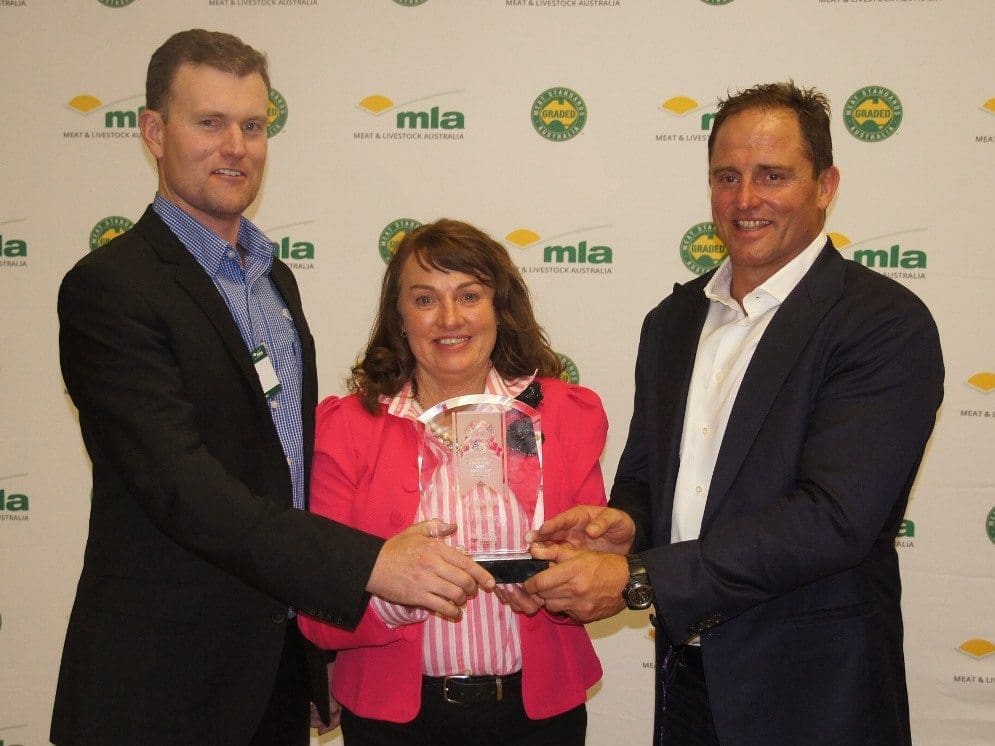
Kaylene Wonka, Blue Poles, Chinchilla, collects hertrophy from MSA general manager Michael Crowley and Maroons legend Billy Moore.
Talwood’s Reardon family wins top MSA grainfed honours
Robert and Jenny Reardon from Talwood won the grainfed division in the 2017 MSA Excellence in Eating Quality award for Queensland/NT on Friday night.
The Reardons topped a field comprising 258 registered producers in Queensland who consigned grainfed cattle during 2015-17. During 2015-17, 59pc of all cattle consigned to MSA from Queensland and the NT were grainfed.
The Reardons are successfully integrating and expanding cattle finishing in an irrigated cotton, dryland cropping and grazing operation that spans 25,000ha on the Qld/NSW border.
The pair set up Reardon Operations feedlot in the 1990s on their Worral Creek property, near Talwood.
General Manager Tristram Hertslet said the keys to consistently achieving good MSA results were using quality feed, good water and excellent stock handlers to finish cattle with an even temperament.
He said the 1000-head capacity feedlot sourced weaners from the Reardon family’s property aggregation spread across the Goondiwindi, Mungindi and Moree districts.
“On average, the feedlot has been turning-off about 300 head of weaners per year, but as the cattle enterprise has been expanded, production is increasing to an expected 600 head turn-off from 2017 onwards,” Mr Hertslet said.
The Reardon Operations feedlot has been MSA-registered since starting operations.
“We joined MSA to receive feedback about the performance and eating quality of our cattle at processing, particularly for traits that are important to consumers, and to monitor any changes in those traits,” Mr Hertslet said.
“This feedback underpins improvements we are making back on-farm, from the paddock, through the feedlot and during preparation for transport.
“In particular, we look at our MSA pH scores to determine if animals are stressed; fat scores to meet particular markets; and the MSA Index value that indicates potential eating quality from all measurements collected.”
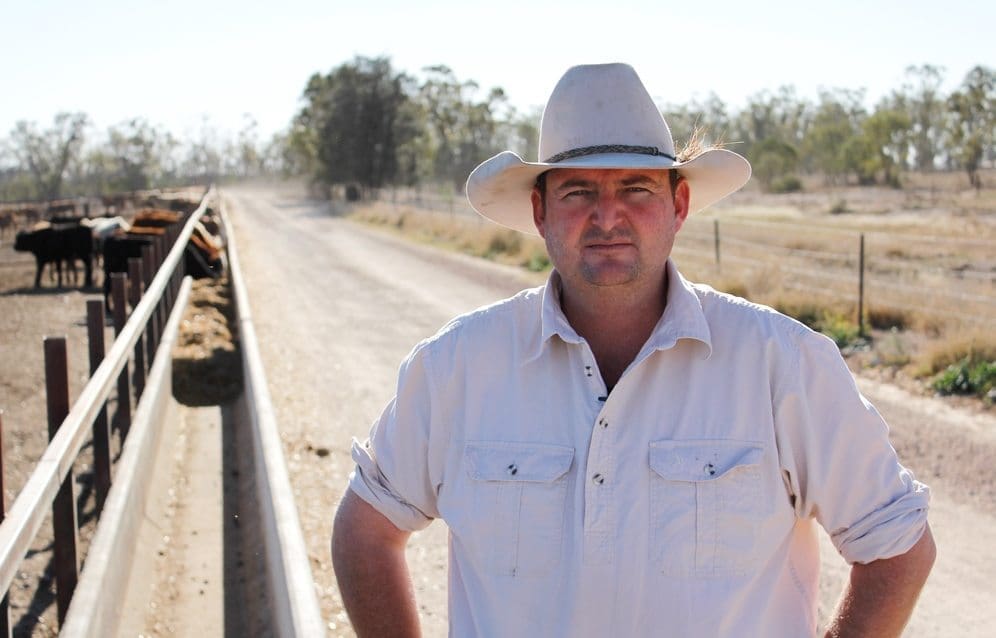
Reardon Operations general manager Tristram Hertslet.
The MSA Index is designed to provide meaningful producer feedback on eating quality performance which can be used for benchmarking. It is independent of any processing inputs and reflects attributes influenced by genetics, pre-slaughter management and the environment.
Cattle consignments coming out of the Reardon Operations Feedlot typically had an MSA Index range of between 55 and 63; achieved 100pc compliance against MSA requirements including pH scores typically between 5.4-5.59; and fat scores met the targets for supplying direct to Woolworths and Coles supermarkets and Teys Australia.
The feedlot finished weaners, mostly sold to Woolworths and Coles, comprise a mix of Angus, Santa Gertrudis and Simmental crossbreeds.
Breeding stock are grazed on the Worral Creek property, which has predominantly been set up for irrigated cotton and dryland winter and summer cropping.
If the season is good and weaner weight gain is sufficient, they are left in the paddock running on native grasses or improved pastures – mostly those sown with an oat cover crop. But if conditions deteriorate and become dry, stock are shifted into the feedlot after a period of introduction to grain and hay in self-feeders in the paddock.
Target entry weight is 300kg and cattle typically stay on feed for 70-120 days, depending on the final market and when cattle reach their optimum point.
Mr Hertslet said the aim was a smooth transition from quality pastures to feedlot finishing to preparing for transport to processor – getting the cattle used to a different ration and to staff being around.
“Our goal is to keep the weaners’ stress levels low the whole way through the supply chain, to produce quality and consistent beef that meets consumer expectations,” he said.
Having a multi-faceted business meant Reardon Operations could produce and use its own silage, grain (mostly gradings) and cotton seed in the feedlot starter, intermediate and finisher rations.
“We are also value-adding to these by-products for the overall business by converting them to kilograms of beef,” he said.
Mr Hertslet said in recent years, more emphasis had been put on using superior genetics for key breeding and eating quality traits and the numbers of cattle now going through the feedlot would be among the highest they had ever been.
Consideration was being given to converting existing dryland production country on the Worral Creek property to permanent pasture to expand the cattle enterprise and, in turn, increase feedlot production in coming years.
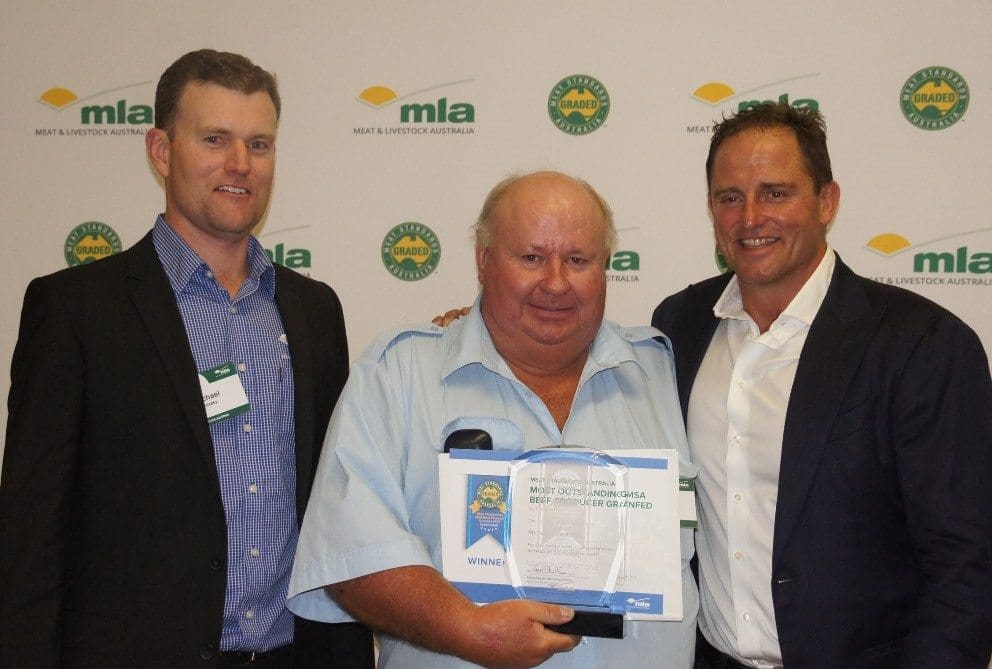
Robert Reardon from Talwood won the grainfed division, flanked by MSA’s Michael Crowley and leage legend Billy Moore
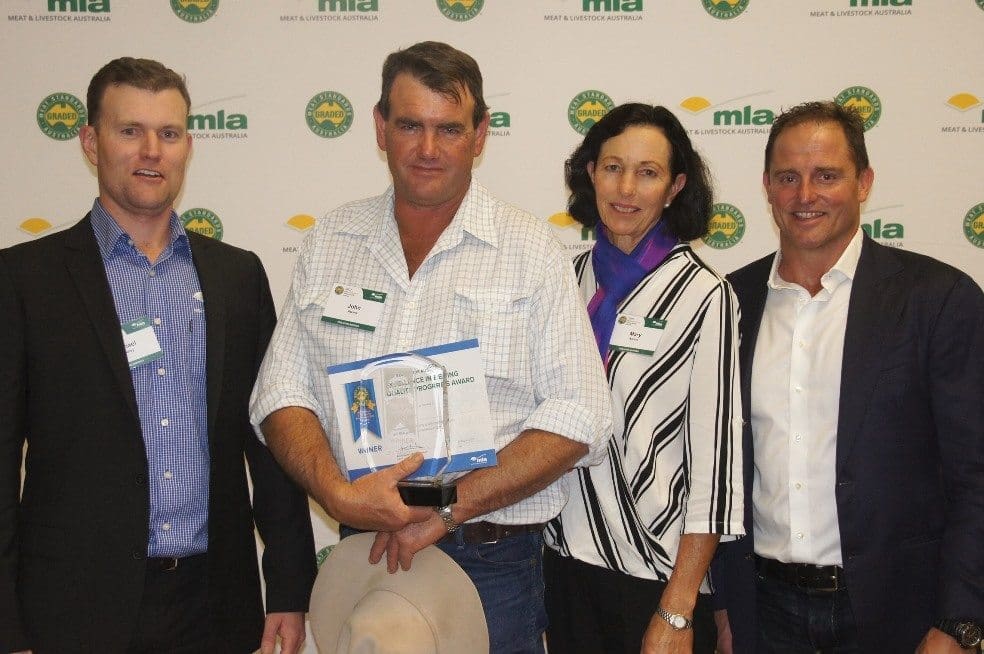
John and Mary Atkins, Spion Kop, Taroom, won the Progress Award for greatest improvement in their MSA Index and compliance results since the 2016 financial year, flanked by Billy Moore and MSA’s Michael Crowley
Upcoming MSA awards and producer forums around Australia
Victoria – Tuesday, 19 September 2017, 2.00pm-8.00pm, Lardner Park, 155 Burnt Store Road, Lardner. Guest speaker Australian Rules legend Robert DiPierdomenico
Tasmania – Thursday 21 September 2017, 2pm-8pm, River Arms Hotel, 1 Crescent Street Ulverstone. Guest speaker Australian cricketer Matthew Wade
Western Australia – Tuesday, 26 September 2017, 2pm-8pm, Ramada Resort 700 Caves Road Marybrook, Dunsborough. Guest speaker former Australian cricket captain Kim Hughes
South Australia – Thursday, 28 September 2017, 2pm-8pm, Hewett Centre, 28-30 Kingfisher Drive, Hewett. Guest speaker Australian Rules and Adelaide Crows legend Mark Ricciuto
New South Wales – Thursday, 5 October 2017, 2pm-8pm, Quality Hotel Powerhouse, Armidale Road, Tamworth. Guest speaker rugby league legend Danny Buderus
